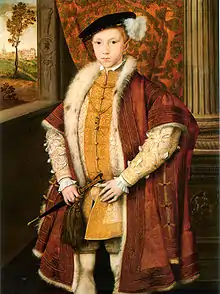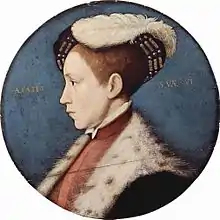Edward VI of England
Edward VI (12 October 1537 – 6 July 1553) was King of England and Ireland, from 28 January 1547, until his death on 6 July 1553.
| Edward VI | |
|---|---|
| King of England and Ireland | |
 Edward as Prince of Wales, 1546. He wears the Prince of Wales's feathers and crown on the pendant jewel. Attributed to William Scrots. | |
| King of England | |
| Reign | 30 January 1547 – 6(OS)10 July 1553 (NS) |
| Coronation | 20 February 1547 |
| Predecessor | Henry VIII |
| Successor | Lady Jane Grey or Mary I |
| Lord Protecters | Lord Somerset (1547–1549) Lord Northumberland (1549–1553) |
| Born | Edward Tudor of Hampton, Prince of Wales 12 October 1537/14 October 1537 (NS) Hampton Court Palace, near London |
| Died | July 6, 1553/10 July 1553 (aged 15) (NS) Palace of Placentia, Greenwich, near London |
| Burial | 9 August 1553 |
| House | House of Tudor |
| Father | Henry VIII |
| Mother | Jane Seymour |

Edward was the son of Henry VIII of England and Jane Seymour. His mother died 12 days after his birth. He became king at the age of 9 when his father died. Although he had two older sisters, Mary and Elizabeth, Edward was the next in line for the throne because he was male. Because he was such a young king, the country was governed by nobles. He had two advisors (or regents). The first was his uncle, Edward Seymour, Duke of Somerset, who became Lord Protector.
For the first two-and-a-half years of Edward's reign, Lord Somerset advised and guided the young king. Somerset was then replaced by John Dudley, Duke of Northumberland.
Edward was the first Protestant king of England. Although his father, Henry VIII, had broken the Church of England away from the Roman Catholic Church, he had not changed much else. Most of the major changes to the Church of England happened during Edward's reign. They were led by Somerset, Northumberland and Archbishop Thomas Cranmer. Also during his reign, England tried to take over Scotland. After a good start, it ended in defeat. His reign also saw economic problems and unrest.
He died when he was 15 1⁄2 years old, probably from tuberculosis. Before he died, Edward named his cousin, Lady Jane Grey, as his heir and excluded his half-sisters, Mary and Elizabeth. He was trying to prevent Mary, a Catholic, from returning the country to Catholicism. However, Mary overthrew Jane less than two weeks later and became the queen. Mary undid the reforms of Edward's reign, but Elizabeth restored them in 1559.
Religious changes
Laws were passed to make churches more plain. Catholic churches were rich in decorations and colour. Now under Edward, stained glass windows and icons were removed from churches; the furniture within churches became very basic and plain.
The actual services became more plain and the common person could now understand what was being said at services – now called Holy Communion – were in English rather than Latin. Archbishop Thomas Cranmer wrote the Book of Common Prayer also in English. Priests did not have to dress in the bright clothing associated with the Catholic Church and under Edward. They were also allowed to marry. The king remained as Head of the Church.
All of these changes were a major break from the traditions of the Catholic Church. In parts of Germany and Switzerland, religious groups had also broken away in protest against the wealth and corruption of the Catholic Church. They became known as Protestant, and England under Edward, became a Protestant country with an independent Church of England.
Edward had never been a healthy boy and his health failed in 1553. After the nine-day reign of Lady Jane Grey, his Catholic half-sister Mary became queen of England and the country went through another period of religious changes.
